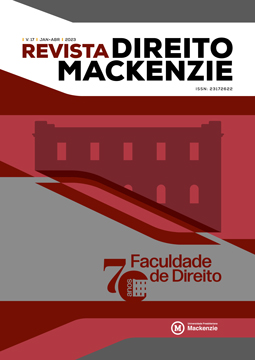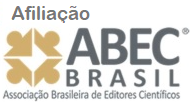EROSION OF CYBERSPACE AND CYBERCULTURE ON THE PRIVACY THROUGH PIERRE LÉVY AND MANUEL CASTELLS THEORIES
Keywords:
Cyberspace, cybercultura, privacyAbstract
This article seeks to analyze the erosion of Cyberspace and Cyberculture from the perspective of Levy and Castells, especially how much of this erosion has affected human privacy and is associated with the evolution of the information society. Its methodology is the legal doctrine that proposes to analyze the works Cyberculture by Pierre Levy and Society in network of Manuel Castells comparing them to the new reality of the information society and the reflexes in privacy. It concludes that the civil society is in need of attention and this is due to the advancement of the insertion of technology in the routine of the civil society, a great challenge of the information society is visualized to suppress this lack without losing the individuality and the essence of the human being.
References
AGUIAR, Odílio Alves. A política na sociedade do conhecimento. Trans/Form/Ação, São Paulo, v.30, n.1, p.11-24, 2007.
ARTHUR, Brian. La natura della tecnologia, Torino, Codice Edizioni, 2011.
BARRETO JUNIOR, Irineu Francisco. Atualidade do conceito sociedade da informação para a pesquisa jurídica. In: PAESANI, Liliana Minardi (coord.). O Direito na Sociedade da Informação. São Paulo: Atlas, 2007.p. 61-77.
BARRETO JUNIOR, Irineu Francisco. Proteção da privacidade e de dados pessoais na Internet: o Marco Civil da rede examinado com fundamento nas teorias de Zygmunt Bauman e Manuel Castells. In: DE LUCCA, Newton; SIMÃO FILHO, Adalberto; DE LIMA; Cintia Rosa Pereira. (Org.). Direito & internet III. São Paulo: Quartier Latin, 2015. p. 100-127.
BARRETO JUNIOR, Irineu Francisco, COSTA, Bruna Marangoni Brancaleone. Hiperexposição pessoal nas redes sociais e seus reflexos no direito. Revista de Direito. Governança e Novas Tecnologias. Salvador, v. 4, n.1, p.92-108, jan./jun., 2018.
BARRETO JUNIOR, Irineu Francisco. PELIZARRI, Bruno Henrique Miniuchi. Bolhas sociais e seus efeitos na sociedade da informação: ditadura do algoritmo e entropia da internet. Revista de Direito. Governança e Novas Tecnologias. Belém, v.5, n. 2, p. 57-73, jul./dez. 2019.
BAUMAN, Zygmunt. Modernidade líquida. Rio de Janeiro: Jorge Zahar Editores, 2001, passim.
BAUMAN, Zygmunt, Vida para consumo. Rio de janeiro: Zahar, 2008.
BAUMAN, Zygmunt. Privacy, secrecy, intimacy, human bonds – And other collateral casualties of liquid modernity. Hedgehog Review, [s.l.], v. 13, n.1, p.20-30, abr. 2011.
CASTELLS, Manuel, A sociedade em rede. A era da informação: economia, sociedade e cultura, v. I, São Paulo, Paz e Terra, 2000.
CASTELLS, Manuel e CARDOSO, Gustavo. A sociedade em Rede do Conhecimento à ação política. Imprensa Nacional, Casa da Moeda, Belém, 2006.
CASTELLS, Manuel. The rise of the network society: information age. v.1. 2nd ed. with new pref. West Sussex: Willey-Blackwell, 2010.
CAPOBIANCO, Ligia. A revolução em curso: internet, sociedade da informação e cibercultura. Universidade de São Paulo: São Paulo, 2010
CORSO, Aline. Reflexões sobre privacidade e vigilância na era dos computadores vestíveis. In: Anais do VIII Simpósio Nacional da ABCiber: Comunicação e Cultura na era de Tecnologias Midiáticas onipresentes e oniscientes. São Paulo. 2014. [s.p.]
D’ANCONA, Mathew. Pós-verdade. Barueri Faro, 2018.
DONEDA, Danilo. A tutela da privacidade no Código Civil de 2002. Anima: Revista Eletrônica do Curso de Direito da Opet, Curitiba, v. 1, p. 89-100, 2009. Disponível em: (d1wqtxts1xzle7.cloudfront.net). Acesso em: 14 jan. 2021.
DONEDA, Danilo. Da privacidade à proteção dos dados pessoais. Rio de Janeiro: Renovar, 2006.
FURTADO, Gabriel Rocha. BEZERRA, Daniel Teixeira. Privacidade, Consentimento Informado e Proteção de Dados do Consumidor na Internet. Revista de Direito do Consumidor. São Paulo, vol. 128, ano 29, p. 205-225, mar./abr., 2020.
HAN, Byung-Chul. Sociedade do cansaço. 2ªed. ampliada. Petrópolis: Vozes, 2017.
HAYLES, N. Katherine. My mother was a computer.Milano-Udine: Mimesis, 2014.
HIRSCH, Dennis. Protecting the inner environment: what privacy regulation can learn from environmental law. Georgia Law Review, [s.l.] v. 41, n. 1, p. 1-63, 2006.
LÉVY, Pierre. A revolução contemporânea em matéria de comunicação. Revista FAMECOS, Porto Alegre, v. 5, n. 9, p. 37-49, 10 abr. 2008. Disponível em https://revistaseletronicas.pucrs.br/ojs/index.php/revistafamecos/article/view/3009/. Acesso em 18 jan. 2021.a
LÉVY, Pierre. O ciberepaço como um passo metaevolutivo. Revista FAMECOS, Porto Alegre, v. 7, n. 13, p. 59-67, 10 abr. 2008. Disponível em https://revistaseletronicas.pucrs.br/ojs/index.php/revistafamecos/article/view/3081. Acesso em 18 jan. 2021.b
LÉVY, Pierre. Cibercultura. São Paulo: Editora 34, 1999.
PRETTO, Nelson de Luca; SILVEIRA, Sérgio Amadeu da. Além das redes de colaboração: internet, diversidade cultural e tecnologias do poder.[online] Salvador:EDUFBA, 2008.
MICROSOFT. What are domains and forests (2014) Disponível em https://learn.microsoft.com/en-us/previous-versions/windows/it-pro/windows-server-2003/cc759073(v=ws.10)?redirectedfrom=MSDN#w2k3tr_logic_what_yokf. Acesso em 13 jun. 2021.
NAUGHTON, John. The evolution of the Internet: from military experiment to General Purpose Technology, Journal of Cyber Policy, [s.l.] v. 1, p. 5-28, 2016. DOI: 10.1080/23738871.2016.1157619
NISSENBAUM, Helen. Respecting context to protect privacy: why meaning matters. Sci Eng Ethics, New York, v. 24, p. 831–852, 2018.
SIMÕES, Isabella de Araújo Garcia. A sociedade em rede e a cibercultura: dialogando com o pensamento de Manuel Castells e de Pierre Lévy na era das novas tecnologias de comunicação. Revista Eletrônica Temática, [s.l.] ano V, v. 5, online, maio, 2009
SOLOVE, Daniel J. Privacy self-management and the consent dilemma. Harv. L. Rev. Cambridge, vol. 126, p. 1890-1903, 2013
SHAPIRO, C.; Varian, A. Informations rules: a strategic guide to the network economy. Boston, Harvard Business School Press, 1999
VIANNA, Eduardo W. e SOUSA, Renato Tarciso B. de. Ciber proteção: a segurança dos sistemas de informação no espaço cibernético. Revista Ibero-Americana de Ciência da Informação. Brasília. v. 10, n. 1, p. 110-131, 2017.
YATES, Frances A., L’arte della memoria. Torino: Einaudi, 1993.
WALDMAN, Ricardo Libel, NEVES, Marcelo Nogueira. Sociedade da informação: a responsabilidade na internet e o mau uso da tecnologia, a busca pela ética no convívio digital. PRIM@ FACIE, João Pessoa, v. 19, n. 40, p. 1-28, 2020
WOLTMANN, Angelita, PEREIRA, Raoni Paiva, KRAUSPENHAAR, Flávia. Relações de consumo, cibercultura e sustentabilidade: o despertar de um “novo” consumidor. Revista Eletrônica do Curso de Direito – UFSM. Santa Maria, v. 8, p. 221-233, 2013.
Downloads
Published
Issue
Section
License
Copyright (c) 2023 Ricardo Waldman, Virginia Zambrano, Amanda Nunes Ronha

This work is licensed under a Creative Commons Attribution 4.0 International License.
The copyright of the articles published in Mackenzie Law Review belongs to the authors, who grant Mackenzie Presbyterian University the rights of publication of the contents, and the assignment takes effect upon submission of the article, or work in similar form, to the electronic system of institutional publications. The journal reserves the right to make normative, orthographic, and grammatical alterations to the originals, with the aim of maintaining the cultured standard of the language, respecting, however, the style of the authors. The content reported and the opinions expressed by the authors of the articles are their exclusive responsibility.











